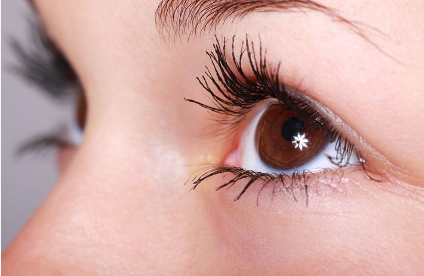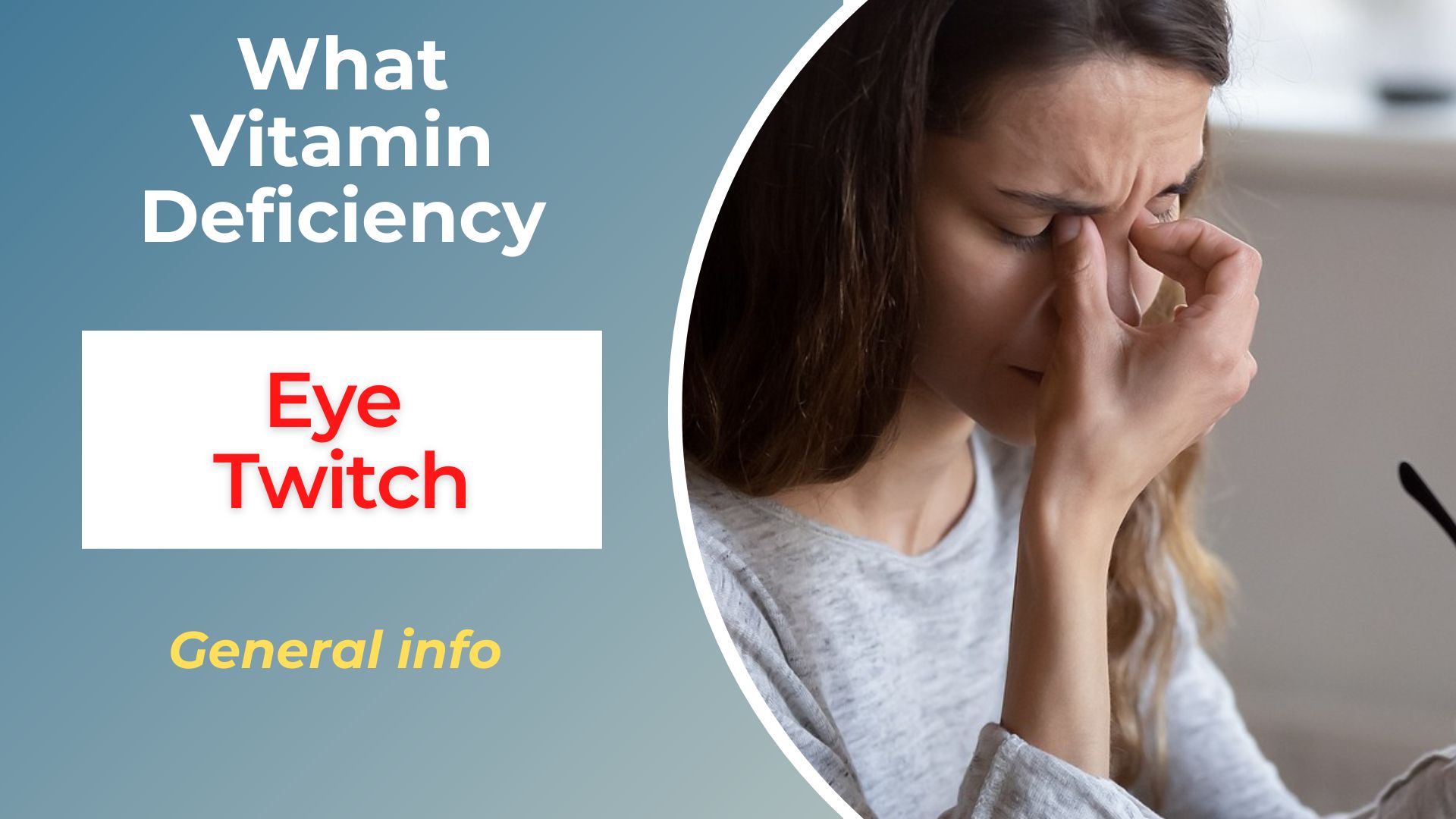Do you experience erratic eye twitching? It’s not just you!
Everybody has experienced eye twitching at some point in their lives. The good news is that it typically clears on its own and is harmless.
Learn more about the symptoms, how magnesium and vitamin B12 deficiency causes eye twitch, and when to see a specialist for treatment.
Also, learn why the most likely reason your eyes are twitching is NOT due to a vitamin deficiency at all – but a deficiency of another sort (hint: sleep!).
What Is An Eye Twitch?

Even though a twitching eye, whose medical term is eyelid myokymia, is a condition that only lasts temporarily, the uncomfortable sensation of having the eyelid jump or blink for no apparent reason is still very bothersome.
The twitches are involuntary muscle contractions that can manifest themselves as a result of a strain placed on the eyes.
The tremors can happen in either eye, but not both at the same time. Also, they can happen in either the upper eyelid, the lower eyelid, or both.
In the worst-case scenario, the twitches may not go away for several weeks, which can cause redness or swelling of the eyes due to eye strain. At this point, you should consult medical help.
Causes of Eye Twitching
Whether it’s the upper or the lower eyelid with muscle weakness, the causes of eye twitches are varied. Here, we break down the most common risk factors.
Lifestyle Factors
Studies reveal that certain lifestyles can lead to involuntary eye movements. For example:
- Taking alcohol is known to accelerate dry eye syndrome symptoms, which can lead to a strain on the eyes.
- Caffeine can cause muscle tension around the eyes. Research reveals that it can increase the risk of dry eye syndrome.
- Physical exhaustion and getting too little sleep can damage the nerves around the eyes, causing them to blink.
- If you spend a lot of time in front of screens, it can prevent you from blinking, and therefore, cause twitches.
- Smoking or tobacco intake causes poor blood supply around the eyes, which can affect their functionality.
- Nutrient deficiencies, such as vitamin B12 deficiency.
Drugs or Medication
Some drugs, especially those used to treat epilepsy or psychosis, are the most common causes of eye twitches. You can stop their immediate use and consult your doctor if you suspect they are causing involuntary eye movements.
Certain Medical Conditions
Eye tremors can be caused by certain illnesses.
- A dry eye condition can cause one eye to quiver sporadically. A lack of tear fluid can irritate the cornea and conjunctiva.
- Glaucoma affects the optic nerve, causing progressive loss of vision.
- Corneal abrasion is a tear or scratch at the front of the eye or cornea affecting the facial nerve.
- Uveitis is the inflammation of a part or all of the middle part of the eye.
- Blepharitis, or the inflammation of the skin covering the eyelid.
- Multiple sclerosis is the most common form of a disabling disease of the brain and spinal cord or central nervous system.
- Dehydration is, in most cases, a major cause of this condition. Even mild dehydration can cause muscle spasms and twitching.
- Age-related macular degeneration is a condition that occurs in people over 50 years old.
- In rare cases, eye twitching signals a neurological disorder. However, in some instances, it can be caused by dystonia, which is a neurological disorder affecting muscle tone.
- Hemifacial spasm leads to vision problems.
- A nerve signaling process.
Treatment and Prevention of Twitching Eyelids: What Solutions?

There’s no specific treatment for twitching eyelids. The solution is to reduce the risk factors mentioned above.
If eyelid twitching is due to an underlying condition, your doctor will treat the illness, which will improve the symptoms.
Sleep More To Prevent Eyelid Spasms
Let’s be clear however. The most likely cause of eyelid spasms and twitches is a lack of sleep, along with too much screen time.
It’s advisable to improve your sleep, cut back on the screens, and take a vacation.
This is the most likely case, but if you still are having eye twitching problems, it can be due to a vitamin deficiency.
Can Magnesium Deficiency Cause Eye Twitching?

Magnesium deficiency in your body can lead to muscle and eyelid spasms. Additionally, magnesium plays an essential role in muscle and normal nerve functions.
Will Magnesium Help Eye Twitching Or Improve Vitamin-Deficiency Eye Twitching?
Experts believe that most people are not getting sufficient magnesium, leading to increased cases of eyelid twitching.
What Kind of Magnesium Should I Take For Eye Twitching?
To correct the nutrient deficiency, you can modify your diet to include foods rich in magnesium, such as whole grains, certain minerals, legumes, oil seeds, and green leafy vegetables.
Other types of foods you can incorporate into your diet include:
- Almonds
- Peanuts
- Brown rice
- Chickpeas
- Bananas
- White beans
- Peas
- Hazelnuts
- Walnuts
- Dark chocolate.
Indeed, many foods contain magnesium, a trace element vital in the management of stress and nerve impulses. As well, its consumption is recommended by health professionals.
Read our reviews for the best magnesium supplements.
Can Vitamin B12 Deficiency Cause Eye Twitching?
Vitamin B (B6, B12, and folic acid) plays an important role in preventing eye twitching and can minimize the risk of developing macular degeneration.
To prevent vitamin B12 deficiency, you should include the following types of foods in your diet:
- Fish
- Meat
- Eggs
- Dairy products such as milk.
For adequate mineralization and hydration, you should take at least 1.5 liters of mineral water daily, which helps to prevent eyelid twitching.
To speed up your nutrient intake, you can consider taking multivitamins. Indeed, a daily dose of barbend’s pick for best women’s multivitamins can help supply your body with magnesium, vitamin B12, vitamin D, and other useful nutrients.
Lifestyle Changes Can Combat Eyelid Twitching
Besides addressing poor nutrition, you can also develop lifestyle changes that aid in combating eye fatigue.
These lifestyle changes include:
- Eye exercises
- Yoga exercises
- Deep breathing, which is a common form of relaxation exercise
- Eye massage
- Reduce caffeine intake
- More sleep
- Apply a cold or warm compress to one eye at a time
- Take a few breaks when you spend too much time on the computer to prevent eye twitches
- Moisturize your eyes by applying eye drops to prevent eye twitching
- Consider getting botox injections to relax the muscles around your eyes
- Further, to prevent this inconvenience which can rear its ugly head at any time, you can reduce alcohol intake and stop smoking.
When You Should You See A Doctor About Your Eye Twitches

You should book an appointment with a medical professional or eye doctor for treatment if you have the following signs or symptoms:
- The twitch lasts for more than a week
- Drooping eyelids
- Eyelids completely close
- Blurry or foggy vision
- Blink uncontrollably in severe cases.
- Double vision or bell’s palsy
- Dizziness
- Discharge from your eyes
- Redness and swelling around your eyes.
For a complete list of vitamin deficiency symptoms read here.
Your doctor will conduct a comprehensive medical examination to rule out any underlying causes, such as dystonia, blepharitis, benign essential blepharospasm, multiple sclerosis, and uveitis. They will also look out for other symptoms that are associated with eye twitching.
Further, they may also suggest a blood test to check if you have vitamin and mineral deficiencies in the body.
Closing thoughts – Vitamin deficiency eye twitching
Adopting a healthy lifestyle, improving your diet, reducing stress, and getting enough sleep are all recommended to reduce eye twitches.
Lacking nutrients such as iron and low levels of vitamin B12 can also cause twitching of the eyelids.
Regarding nutrient deficiency, we recommend that you consume foods that are high in magnesium to prevent eyelid twitches. Also, red meat can supply your body with iron.
Overall, good nutrition is the cornerstone of a well-cared for and healthy eye. If you also exercise, you will be doing your eyes a great favor.
Check out our ultimate beginner’s guide to supplements and vitamins here.



